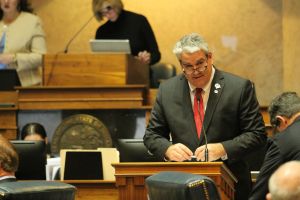
Libertarian gubernatorial candidate Donald Rainwater talks with supporters. In 2020, the candidate netted more than 11% of the vote — and he thinks he can win it all in 2024. (Courtesy Rainwater for Indiana Campaign)
Donald Rainwater is no stranger to campaigns.
The Libertarian has run for state Senate, the Indiana House of Representatives and for mayor of Westfield. But it was his 2020 run for governor that brought unprecedented attention to Rainwater, who ran on a platform with several pillars — the most timely of which opposed several of Gov. Eric Holcomb’s COVID-19 actions.
Rainwater went on to win 11.4% of the vote, a high for a third-party candidate in Indiana. And he thinks he can do even better in 2024.
“I always get a kick out of it because the question is, “Do you hope to do as well?’ No, I hope to win or I wouldn’t bother doing it,” Rainwater said. “Are the odds against me? Certainly. But I have a chance.”
The candidates and tools you need to cast your vote: Indiana Votes 2024
That chance comes from his efforts to appeal to all Hoosiers, rather than a political or demographic subset, he said.
But his first political run was prompted by something much smaller than a global pandemic: a 2016 radio ad pushing to increase the cigarette tax, which the promotion claimed would have the dual benefit of reducing smoking rates while also raising state revenue.
“That’s just intellectually dishonest, because you cannot discourage people from smoking and raise money with a tax. Because either people will quit smoking, which means they quit paying the tax, or you’re going to raise money for the roads,” Rainwater said. “You can’t do both. So saying that your goal is to do both, to me, is a little offensive.”
And so Rainwater jumped into politics.
Senate Republicans have long resisted increasing the cigarette tax due to its volatility long-term. At just under $1 per pack, Indiana’s tax is nearly half of the national average tax of $1.96 per pack and Hoosiers use cigarettes at a higher rate than their peers.
Rainwater likened the advertising push to childhood games, saying that he didn’t “think the government should be trying to play” games like Mother May I or Simon Says with its constituents.
“I should not have the government telling me every move I make. And every year it gets worse and worse and worse. We lose more of our individual freedoms to gaslighting like that, and it needs to stop,” Rainwater said.
Rainwater’s proposals
The Libertarian Party was more of a natural fit for Rainwater, who said he’d been exposed to both Democratic and Republican ideals at home.
“I was able, as I grew up, to see the benefits and the detriments on both sides, and the reality that there were good things in the middle,” Rainwater said. “But there was a lot of stuff on both sides that I thought was inappropriate.”
Rainwater’s father was laid off during his first year of college, and so the Warren Central High School graduate couldn’t continue his studies. Instead, he enlisted in the Navy and served for nearly eight years.
Following his service, Rainwater started learning and teaching about computers, which eventually morphed into programming and software. Now, his experience includes software engineering, quality assurance and project management — qualifications that eventually brought him to state government as part of a contracting team for a few years between 2014 and 2017. The perceived inefficiency he witnessed furthered his desire to “do something to make things better.”
“As time has passed, over the last eight years, I think things have not gotten better; they’ve gotten worse,” Rainwater said. “So my desire to want to represent the people who are struggling and who need government to be better — not bigger — has become more important.”
Rainwater’s platform deviates from the national Libertarian campaign in several ways, including Rainwater’s opposition to abortion rights and other social issues.
His biggest proposal so far would upend the state’s property tax system by making it 7% of a home’s purchasing price, the same level as Indiana’s sales tax. After that a person would pay no more but still receive government services. He would also change how much the state charges in gas taxes.
And he highlighted ongoing education spending that didn’t seem to be reflected in test scores — the latter of which he’d “do away with.” He also said too many businesses exist solely to fulfill government contracts on projects like road construction and still reap benefits when they go over budget or over the allotted timeline, a practice he said he’d end.
“Those are all symptoms of what I think is the true issue: we have too much government in Indiana. We have government that’s taking, taking, taking and not doing the right things with it,” Rainwater said. “These are things that need to change, because the reality is … every citizen in the state of Indiana who earns a living needs that money worse than the government does. Especially when they’re not even using it for the benefit of the citizens.”
Criticism of current government
On and off the debate stage, he criticized the Indiana Family and Social Services Administration for “letting money go out the back door” in Medicaid overpayments, part of an allegation winding its way through the courts. The claim comes as the agency struggles to realign its budget after reporting a nearly $1 billion shortfall that prompted several, administrative-level changes.
Rainwater targeted his ire toward the decision to curb the use of parents as attendant caregivers, diverting them from a program with hourly payments to a per diem program with a far lower reimbursement.
Though the tactic saves the state money, Rainwater said the government made a “promise” to the parents who left the workforce to be caregivers to their severely disabled children. He connected the decision to the alleged Medicaid fraud, which whistleblowers say the agency failed to recoup due to the political ties of hospitals and insurers.
“I’m not going to make the judgment on whether it’s a good use of government dollars. I’m saying that the government made a promise to individual citizens and those citizens altered their financial arrangements in order to care for their child based on a promise the government made,” Rainwater said. “If I need to choose between fulfilling the promise government made and letting somebody overbill the taxpayers of the state of Indiana, I’m going to side with the citizens.”
Read more: All three Indiana gubernatorial candidates meet — for the first time — on 2024 debate stage
Whether it was Medicaid programming or the state’s approach to economic development, Rainwater weighed the benefit to the average Hoosier over that of a big company.
He continued by using the adage, “a rising tide lifts all boats.” The current system, he said, is a tsunami of government funding that only lifts the biggest boats — like hospitals or large economic projects — but capsizes the smaller boats, or everyday Hoosiers.
“The average Hoosier is being sunk by this economic philosophy that is making large corporations better off while the rest of us are drowning under it,” Rainwater said. “And no, I don’t have all the answers to that. But I think that we have to figure out how to sit down and start having those conversations, because we’re not having those conversations today.”
Rainwater’s own move from Westfield to southern Johnson County was driven, he said, by his desire to escape the “forced economic development” of Hamilton County.
Many of Rainwater’s proposals, such as his reform of the property tax system or a plan to eliminate the state’s income tax, would essentially eliminate the biggest revenue streams for both the state and local governments. To make up the deficit, he proposes eliminating “corporate welfare,” such as tax abatements and tax increment financing that alleviate the tax burden of businesses.
“I think that instead of people saying, ‘Well, how would you replace that income?’” Prove to me that you need it. That’s what government should be doing,” Rainwater said. “What we’ve done is we’ve just abdicated any responsibility for the government to be really accountable to us.”
Rainwater emphasized that none of his platform should be seen as a “promise” to voters, especially considering that he’d have to work with the General Assembly, which controls both the purse strings and the legislative process. Republicans have controlled both chambers for over a decade.
“I can’t make promises. I’m running for governor, not king,” Rainwater quipped.
GET THE MORNING HEADLINES.
Indiana Capital Chronicle is part of States Newsroom, a nonprofit news network supported by grants and a coalition of donors as a 501c(3) public charity. Indiana Capital Chronicle maintains editorial independence. Contact Editor Niki Kelly for questions: info@indianacapitalchronicle.com. Follow Indiana Capital Chronicle on Facebook and X.











